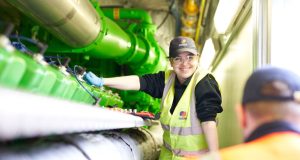Facilities professionals have a long list of issues to deal with this year. This includes achieving sustainability and social value objectives, re-evaluating the role of the physical workplace, embracing new technologies and ensuring the delivery of high-quality services in a time of economic uncertainty. How well do you think the sector is prepared to meet the challenges and opportunities ahead?
 THE CHAIR OF IWFM’S VIEW
THE CHAIR OF IWFM’S VIEW
MARK WHITTAKER,
GENERAL MANAGER, THOMSON FM
Towards the end of 2023 the Institute of Workplace and Facilities Management (IWFM) published its ‘3 trends for the future’ report to coincide with the Institute’s 30th anniversary. The report identified three “mega-trends” which the Institute believes will shape the future of the workplace and facilities management sector in the years to come. The megatrends identified were the increasing shift of workplace strategy as an increasingly high profile service, secondly the harmonising of people, the planet and profit and finally, navigating and exploiting the link between smart buildings and workplace and facilities management.
As climate change increases and sociopolitical tensions continue, organisations increasingly expect their FM professionals to deliver positive and reportable outcomes around sustainability and social value. This increases the focus on day-to-day processes like energy consumption, waste management and eco-efficiency, acknowledging employee wellbeing and workplace experience, and monitoring the organisation’s global and local impact.
Fully remote and hybrid working has triggered debates on the what the future role of the physical workplace will be. As such, facilities management must factor in the needs of co-located professionals, such as good sanitation and comfort, and those of the offsite professionals, including up-to-date digital tools and secure data storage, while also meeting organisational demands, including optimised productivity and increased sustainability.
The exponential rise of digital innovation means that FM leaders have new demands around keeping technological systems and processes up to date, to ensure improved outcomes are being achieved. Upskilling and reskilling will be required to ensure there are the required levels of competence within organisations.
Those involved in the industry need to be well-versed on the future direction of travel and to champion these to ensure there is the momentum and accountability to drive change. In addition, ensuring people have the right skills and knowledge will also be essential and is an area where I know IWFM will have a crucial role to play in supporting the profession. The Institute will also continue to lead the discussions on the increasingly important and better understood areas of neurodiversity, equity, diversity and inclusion (EDI) and wellbeing in the future.
 THE FM CONSULTANT’S VIEW
THE FM CONSULTANT’S VIEW
BERNARD CROUCH,
DIRECTOR, ACUMEN FM
The FM and workplace sector sometimes face a new year with trepidation, so we’d be looking to reduce overheads while maintaining service delivery. But as ever, we are ready for the challenges that 2024 holds.
When it comes to sustainability, Carbon Neutral target dates doubtless seemed a long way off when originally set, but now we have a challenge to meet those targets. In the UK we are experiencing an increased risk of flooding and higher than normal temperatures, both of which need to be factored into our forward planning. In 2024 we need to consider, biodiversity, renewable energy, improved water management, sustainabletransportation and a circular economy.
Social value is another crucial issue. It is hard to recruit candidates nowadays and it follows that staff retention has also become more critical. Younger employees will often consider an organisations approach to CSR as well as DEI (diversity, equity and inclusion) when choosing a new job, so we need to ensure these are being properly addressed.
We’re also faced with WFH (working from home) versus the physical workplace and the pressure is mostly on encouraging staff back. The challenge with hybrid working is that of providing a full range of FM services five days a week, but seeing an almost empty building on two of those days when a client can argue that catering and cleaning for instance be provided at a lower level with commensurately reduced costs.
AI and other new technologies is another pressing issue. Our sector is lagging in introducing new technology. Older CAFM systems are not always capable of delivering what is needed, and the adoption of sensors that could help deliver a more proactive instead of reactive FM & Workplace service has been slow.
AI can help us to predict maintenance and repairs, can automate repetitive FM tasks, and improve the efficiency of the building leading to cost savings and reduced energy usage.
Finally, we face the challenge of being told to deliver high quality services but on reduced budgets, we are being asked to encourage WFH staff back into the workplace, but additionally we need to deliver on the five challenges that I have detailed above.





